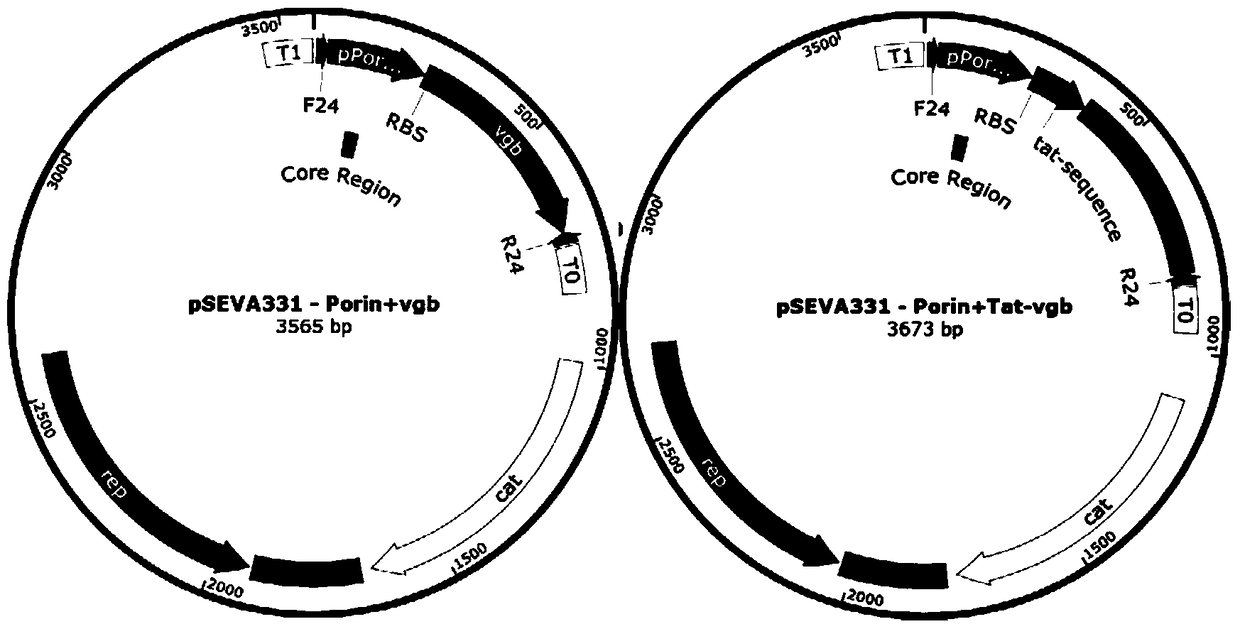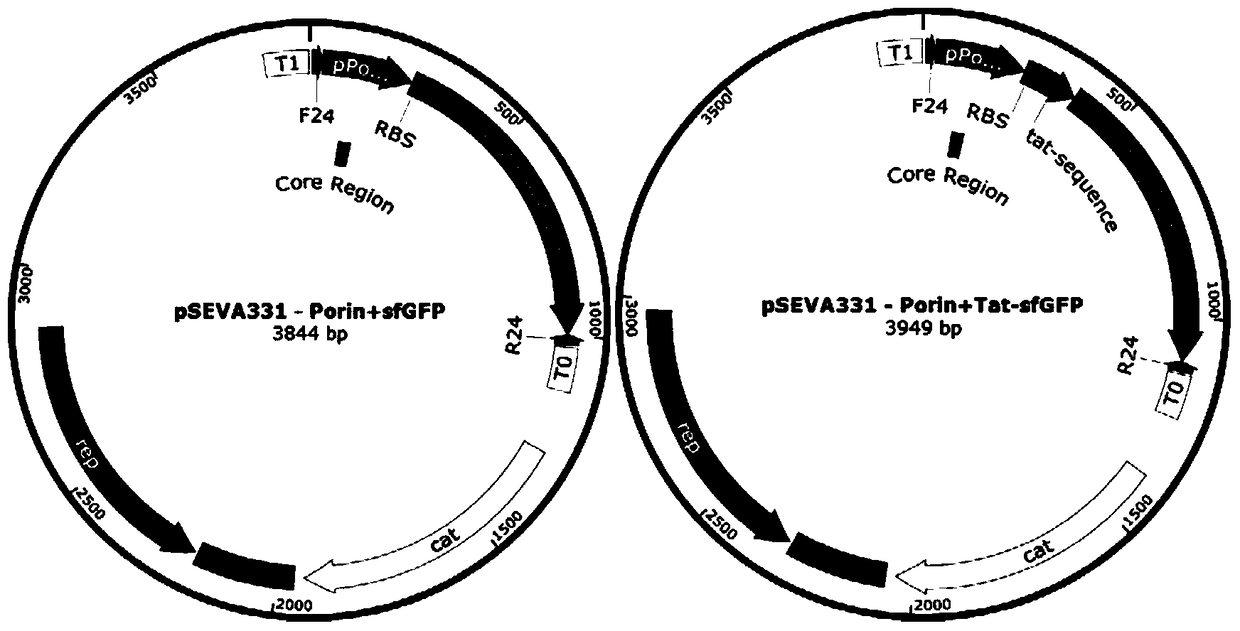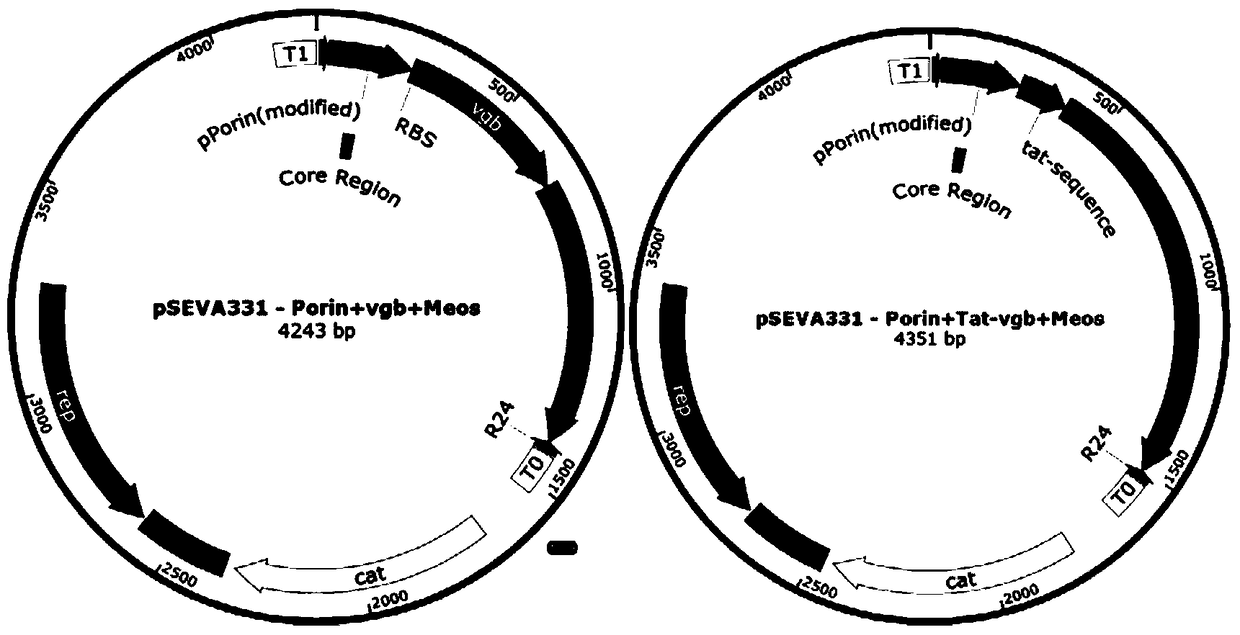A method for increasing the density of fermented cells by using hemoglobin
A hemoglobin and cell technology, applied in the biological field, can solve the problems that are not conducive to the high-density growth of cells and the decrease of oxygen utilization efficiency, so as to achieve the effect of increasing the growth quantity and density, increasing the utilization rate, and reducing losses
- Summary
- Abstract
- Description
- Claims
- Application Information
AI Technical Summary
Problems solved by technology
Method used
Image
Examples
Embodiment 1
[0090] Embodiment 1, increase fermentation unit cell density by intracellular expression of VHb hemoglobin gene
[0091] 1. Construction of engineering bacteria
[0092] 1. Construction of expression vector pSEVA331-Pporin+vgb
[0093] 1), the acquisition of the target promoter Pporin
[0094] Extract the genome of Halomonas TD01 (Halomonas TD01, now preserved in the Culture Collection Center of the Institute of Microbiology, Chinese Academy of Sciences, preservation number CGMCC4353; patent publication number CN102816729A) as a template, with G-Pporin-1TF and G-Pporin-2TR as Primers, PCR amplification with pfu enzyme.
[0095] Primers are:
[0096] G-Pporin-1TF: 5'gataacaatttcacacaggacggccgctgagacctgccag 3'
[0097] G-Pporin-2TR: 5' ctcctctttctctagtaaagtctgcagctggcttgc 3'
[0098] PCR reaction conditions:
[0099] Pre-denaturation at 95°C for 5 minutes; denaturation at 95°C for 30 seconds, annealing at 58°C for 30 seconds, extension at 72°C for 30 seconds, 30 cycles; and ...
Embodiment 2
[0159] Example 2, through the expression of the VHb hemoglobin gene in the periplasmic space to increase the cell density of the fermentation unit
[0160] 1. Construction of engineering bacteria
[0161] 1. Construction of expression vector pSEVA331-Pporin+Tat-vgb
[0162] 1), the acquisition of the target gene Pporin
[0163] The genome of Halomonas TD01 (Halomonas TD01) was extracted as a template, G-Pporin-1TF and G-Pporin-2TR were used as primers, and PCR amplification was performed with Pfu enzyme.
[0164] Primers are:
[0165] G-Pporin-1TF: 5'gataacaatttcacacaggacggccgctgagacctgccag 3'
[0166] G-Pporin-2TR: 5' ctcctctttctctagtaaagtctgcagctggcttgc 3'
[0167] The PCR product of 218bp was obtained, which was the target gene Pporin, and its nucleotide sequence was the 33rd-250th position from the 5' end of sequence 2 in the sequence listing.
[0168] 2), the acquisition of the target gene tat
[0169] The genome of Escherichia coli K-12 line JM109SG was extracted a...
Embodiment 3
[0357] Example 3, Increase the cell density of the fermentation unit by displaying hemoglobin on the cell surface
[0358] 1. Construction of engineering bacteria
[0359] 1. Construction of expression vector pSEVA331-Pporin Tat-vgb-Ag43
[0360] 1), the acquisition of the target gene Pporin
[0361] The genome of Halomonas TD01 (Halomonas TD01) was extracted as a template, G-Pporin-1TF and G-Pporin-2TR were used as primers, and pfu enzyme was used for PCR amplification.
[0362] Primers are:
[0363] G-Pporin-1TF: 5'gataacaatttcacacaggacggccgctgagacctgccag 3'
[0364] G-Pporin-2TR: 5' ctcctctttctctagtaaagtctgcagctggcttgc 3'
[0365] The PCR product of 218bp was obtained, which was the target gene Pporin, and its nucleotide sequence was the 33rd-250th position from the 5' end of sequence 7 in the sequence listing.
[0366] 2), the acquisition of the target gene tat
[0367] The genome of Escherichia coli K-12 line JM109SG was extracted as a template, G-tat-1TF and G-tat-...
PUM
 Login to View More
Login to View More Abstract
Description
Claims
Application Information
 Login to View More
Login to View More - R&D
- Intellectual Property
- Life Sciences
- Materials
- Tech Scout
- Unparalleled Data Quality
- Higher Quality Content
- 60% Fewer Hallucinations
Browse by: Latest US Patents, China's latest patents, Technical Efficacy Thesaurus, Application Domain, Technology Topic, Popular Technical Reports.
© 2025 PatSnap. All rights reserved.Legal|Privacy policy|Modern Slavery Act Transparency Statement|Sitemap|About US| Contact US: help@patsnap.com



